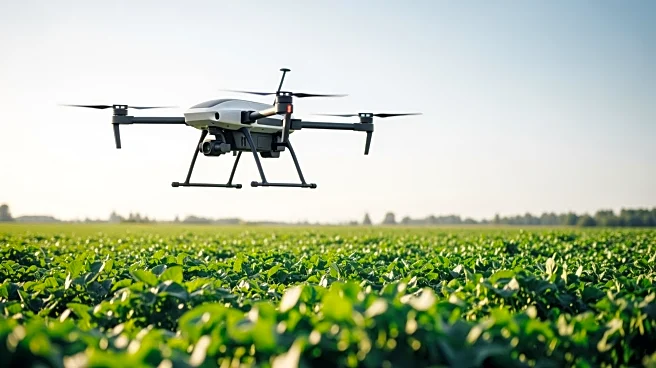What's Happening?
The United States is advancing its digital agriculture sector with significant developments aimed at integrating artificial intelligence (AI) and digital tools into farming practices. In July 2025, US Agriculture, LLC partnered with CeresAI to deploy
AI-powered farmland monitoring, enhancing real-time crop health analytics and reducing manual inspections. This initiative is part of a broader strategy to strengthen data-driven farm management and operational efficiency. Additionally, the U.S. Department of Agriculture released its first comprehensive AI Strategy for fiscal years 2025-2026, promoting innovation and sustainable productivity in agriculture. These efforts are complemented by major farmland investment firms adopting advanced remote sensing and digital-twin technologies to improve transparency and oversight across various crop types.
Why It's Important?
The integration of AI and digital tools in agriculture is crucial for enhancing productivity and sustainability. By adopting these technologies, the U.S. aims to improve farm management practices, reduce waste, and optimize crop yields. This shift towards data-driven agriculture is expected to benefit farmers by providing more accurate insights into crop health and soil conditions, ultimately leading to better decision-making and resource management. The focus on AI and digital tools also aligns with global trends towards climate-smart farming, which is essential for addressing environmental challenges and ensuring food security. Stakeholders in the agriculture industry, including farmers, technology providers, and policymakers, stand to gain from increased efficiency and innovation.
What's Next?
The U.S. agriculture sector is likely to see further advancements in digital farming technologies as the AI Strategy is implemented. This may include increased collaboration between technology companies and agricultural firms to develop new solutions for precision farming and crop monitoring. As these technologies become more widespread, there may be a shift towards more sustainable and regenerative farming practices, supported by data-driven insights. Policymakers and industry leaders will need to address potential challenges related to technology adoption, such as ensuring equitable access to digital tools and managing data privacy concerns.
Beyond the Headlines
The move towards digital agriculture and AI integration raises important ethical and legal considerations, particularly regarding data privacy and the equitable distribution of technology benefits. As these technologies become more prevalent, there will be a need to establish clear guidelines and regulations to protect farmers' data and ensure fair access to digital tools. Additionally, the shift towards AI-driven farming may lead to changes in labor dynamics, with potential impacts on employment in traditional farming roles. These developments highlight the need for ongoing dialogue between stakeholders to address the broader implications of digital agriculture.
















